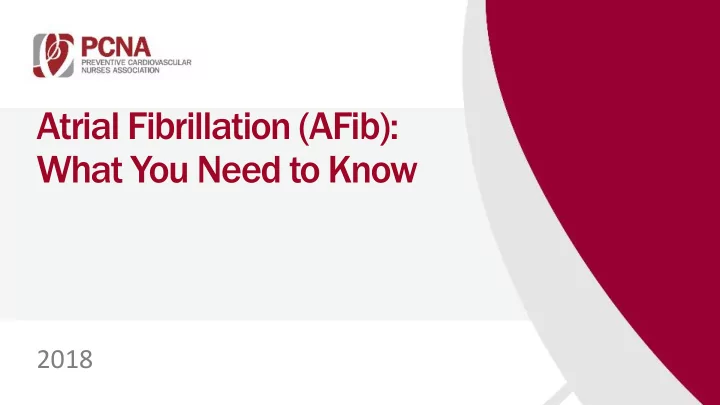

Atrial Fibrillation (AFib): What You Need to Know 2018
Acknowledgements • Thank you to Bristol-Myers Squibb/Pfizer Alliance for support of this program.
What is AFib? • Atrial fibrillation also known as AFib , is an irregular heartbeat. Your heart: • Flutters • Beats unevenly • Beats quickly • You may not have any symptoms. • With AFib, you may be at a greater risk for heart attack or stroke.
What are the risk factors for AFib? • Age 65+ • Family members with stroke • Heart-related factors: • High blood pressure • Heart disease • Recent heart surgery • Heart failure • Heart valve problems • Heart attack at young age
What are the risk factors for AFib? • Lifestyle factors • Heavy alcohol use • Recreational drug use • Excessive caffeine intake • Smoking • Extreme stress
What are the risk factors for AFib? • Health issues • Overweight or obesity • Diabetes or high blood sugar • Thyroid problems • Kidney disease • Sleep apnea • Have had a stroke • Lung problems
What are the symptoms of AFib? • Fast, fluttering, or uneven heartbeat • Dizzy or faint feeling • Feeling very tired, even after sleeping or resting • Normal day-to-day activities are hard to do
What are other symptoms of AFib? • Feeling short of breath • Chest pain or discomfort • Swelling in the legs • Feeling stressed • Mental confusion You may have no symptoms at all
What if you think you have AFib? • Tell your nurse or doctor if you have any risk factors or symptoms • Learn how to take your pulse • Track your rate and rhythm • Smart watch • Smart phone with attached monitor • Learn how to take your blood pressure • Pay attention to how you feel
What your provider can do • Health history & physical exam • Echocardiogram • Electrocardiogram EKG or ECG • Exercise stress test • Blood tests • ECG monitor with recorder • Holter monitor, event recorder, Zio Patch, Loop recorder • Readings: few days to few weeks
What can you do if you have AFib? • You will work with your doctor or nurse on a plan that works for you • You can lower your risk for a stroke by following lifestyle changes • This can help improve your overall health, too!
What can you do if you have AFib? • Lifestyle: • Eat a healthy diet with vegetables, fruits, whole grains and healthy fats • Don’t smoke • Be physically active • Lower your stress • Reduce caffeine and alcohol use
What can you do if you have AFib? • Medicines: • Keep your heart from beating too fast • Changing your heartbeat to a normal rhythm with regular beats • Preventing blood clots or stroke
What can you do if you have AFib? • Surgical treatments: • Your health care provider may discuss surgical options for treating your AFib and to help keep your heartbeat regular.
Managing risk factors and AFib • By modifying your risk factors and treating your AFib, you can lower your risk for a stroke or heart failure. • Make sure to ask your doctor of nurse about any questions you have.
Questions
Recommend
More recommend